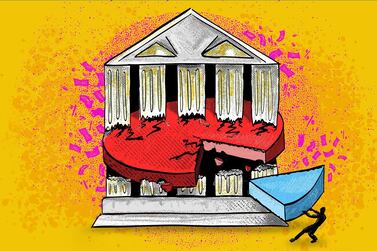I am working, but my salary was cut by 15 per cent last October because of the Covid-19 pandemic. In March this year, my salary was increased slightly but remains 7 per cent below the original level. I am unsure when it will be fully restored.
I have a personal loan with a monthly repayment of Dh6,766 – I have not missed any payments on this and it ends in March 2023. However, my issue is with my credit card, which I maxed out to its limit of Dh93,000. I managed to pay off Dh75,000 but after that, I was only able to afford the minimum monthly repayments.
In just two years, the outstanding amount of Dh18,000 that I owed on the credit card has ballooned to Dh150,000 because of interest charges and late payment fees.
I am in a financial mess and the bank’s collection department is making it worse by harassing me with their calls and insults. They are also threatening me with a police case, travel bans and say they will prevent me from changing jobs.
Each time they call, I ask them to wait a few days until I am paid and I will make a minimum payment. Money is tight but I compensate the following month by paying two instalments together. How can I resolve this issue and manage my outstanding credit card debt to prevent the upsetting calls from the collection agents? JD, Dubai
Debt panellist 1: Philip King, head of retail banking at Abu Dhabi Islamic Bank
This is an understandably difficult situation to be in, especially with the surge of unanticipated salary cuts resulting from the Covid-19 pandemic. We applaud you for your continued commitment and efforts to repay your debt despite your challenging circumstances.
That said, there are many measures being taken to reduce the financial burden on individuals during this time, as well as viable solutions that you can explore to get through this challenging period.
While cards are typically beneficial for short-term financing needs or emergencies, they can be detrimental in the long term – especially if not managed properly. Because people don’t feel they are actually spending money when using credit cards, there is a tendency to overspend, which then leads to huge balances. Credit cards also carry high interest rates and fees that make it harder and more expensive to pay off the debt.
Typically, when you miss even one repayment, banks charge a late payment fee. However, after three missed repayments and repeated warnings from your bank, a police case could be filed against you.
Therefore, we highly recommend that you take the initiative to contact your card provider and inform them of your situation following your salary reduction.
During this time, banks are being highly encouraged to be flexible and understanding of their customers’ circumstances. Therefore, it is unacceptable for the bank’s collection department to communicate with you in such an unprofessional manner, and we recommend that you escalate this matter to the highest representatives at your bank, informing them of these recurring incidents.
It is in their interest to resolve your issue promptly and mitigate any risks of default, so they should be highly likely to co-operate with you on a payment deferral or even new repayment terms.
You can ask your bank if it can offer you instalment postponements or a payment holiday on the basis of the ongoing Targeted Economic Support Scheme (Tess) programme, in which customers who provide evidence of being impacted by the pandemic can be offered some financial relief. The scheme has been extended to mid-2022 to ensure that individuals and businesses are financially supported as they recover from the economic impact of Covid-19.
During this challenging time, we highly recommend that you decrease your spending as much as possible through tight budgeting or even contacting family for financial assistance. It might also be helpful to consider other job opportunities that will give you a higher salary, allowing you to be in a better financial position.
Debt panellist 2: Stuart Ritchie, director of wealth advice at AES
In the first instance, try to speak to the most senior person you’re able to at your bank to explain your situation and reach an agreement on what your repayments will look like. Going to your bank branch in person may help you do this.
You may be able to extend the term of your loan, thus reducing your monthly repayment amount. This difference could then be used towards your credit card payments, which you are finding harder to control.
The CBUAE extended the validity of its Tess scheme until mid-2022. Under this scheme, UAE banks have proactively offered up to three months of payment holidays to borrowers who have been financially impacted by the Covid-19 pandemic.
Given your history of timely and full payment, along with your difficult circumstances, the bank should be willing to support you as you meet the criteria of Tess.
In practice, banks may vary in their willingness to grant payment holidays or amend repayment plans, so you will need to be persistent and reaffirm that you want to settle your debts and were close to doing so before interest and late fees made the amount you owe balloon.
It will be necessary to provide documentation from your employer stating that you had your salary reduced due to circumstances related to Covid-19 to support your request with the bank.
Finally, try not to take on any further debt to prevent the amount you owe becoming unmanageable. Reduce your cost of living where possible until you have a clear plan in place.
Debt panellist 3: Felicity Glover, personal finance editor at The National
The Covid-19 pandemic has caused millions of people around the world to experience financial stress and you are not alone. Compounding interest, which can be as high as 40 per cent per year, and late fees on credit cards can be financially crippling if they are not paid off in full at the end of each month.
There are some options that you could explore, such as requesting a payment deferral or restructuring support from your bank through the Central Bank's Tess programme, which my fellow panellists discuss above.
It is also important to look carefully at your expenses to see where some savings can be made. Work out your needs, such as rent, utilities, transport and food, versus your wants. Is there anything in the wants category that you can cut back on? This could include anything from restaurant visits to a monthly gym membership, cutting back on takeaway coffees or catching taxis, for example.
If you have an asset to sell, this is also worth considering as it could pay off the debt completely and allow you to move on from this and start saving for your future.
Finally, I would advise you to lodge a complaint with your bank regarding the calls you are receiving from the collections department. You have a right to be treated with respect despite your financial difficulties. You can submit a complaint via the bank's website. If the bank does not respond within 30 days to your complaint, or you are dissatisfied with its response, you can then raise the issue with the Central Bank's Consumer Protection Department, along with the complaint reference number and evidence of your communications with the bank.
The Debt Panel is a weekly column to help readers tackle their debts more effectively. If you have a question for the panel, write to pf@thenational.ae









